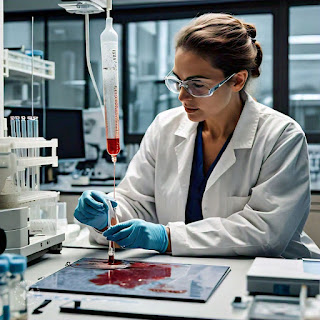Breakthroughs in Liquid Biopsy Tests: Transforming Modern Diagnostics
Liquid biopsy tests are revolutionizing the landscape of medical diagnostics and personalized treatment strategies. Unlike traditional tissue biopsies, a liquid biopsy test analyzes biomarkers such as circulating tumor DNA (ctDNA), circulating tumor cells (CTCs), and exosomes found in bodily fluids like blood, urine, or saliva. This minimally invasive approach offers several compelling advantages that have garnered significant interest among both patients and healthcare professionals.
Key Insights on Liquid Biopsy Tests
Early Cancer Detection: Liquid biopsy tests excel in
identifying cancers at an early stage. By detecting genetic mutations and
alterations in ctDNA, these tests can identify malignancies before they become
detectable through conventional imaging methods. Early detection is crucial for
improving prognosis and expanding treatment options.
Real-Time Monitoring: One of the most valuable
aspects of liquid biopsy tests is their ability to provide real-time monitoring
of cancer progression and treatment response. Unlike tissue biopsies, which are
often performed infrequently, liquid biopsy tests can be conducted regularly to
track how a tumor evolves, allowing for timely adjustments in therapy.
Personalized Treatment Plans: Liquid biopsy tests
offer detailed genetic information about a tumor’s unique profile. This
information is essential for developing personalized treatment plans tailored
to the specific genetic alterations of an individual's cancer, thereby
enhancing the effectiveness of targeted therapies.
Non-Invasive and Patient-Friendly: The non-invasive
nature of liquid biopsy tests makes them more comfortable for patients compared
to traditional biopsies, which can be painful and carry risks of complications.
This ease of access encourages more frequent testing and better patient compliance.
Comprehensive Tumor Profiling: Tumors are often
heterogeneous, meaning they consist of diverse cell populations with different
genetic mutations. Liquid biopsy tests capture a broader genetic landscape by
analyzing biomarkers shed from various parts of the tumor, providing a more comprehensive
understanding of its genetic diversity.
Detection of Minimal Residual Disease: After
treatment, liquid biopsy tests can detect minimal residual disease (MRD), which
refers to tiny amounts of cancer cells that remain in the body. Identifying MRD
early can help in preventing relapse by initiating further treatment promptly.
Future Perspectives
The future of liquid biopsy tests is promising, with ongoing
advancements aimed at increasing their sensitivity and specificity. Integration
with technologies such as next-generation sequencing (NGS) and artificial
intelligence (AI) is enhancing the accuracy and speed of these tests.
Additionally, expanding the applications of liquid biopsy tests beyond cancer,
such as in monitoring infectious diseases and genetic disorders, is an exciting
area of research.
Challenges and Considerations
Despite their potential, liquid biopsy tests face challenges
that need to be addressed. Standardization of testing protocols, improving
detection limits for rare biomarkers, and ensuring cost-effectiveness are
critical areas requiring attention. Furthermore, extensive clinical validation
is necessary to establish liquid biopsy tests as a reliable tool across diverse
patient populations and cancer types.
Conclusion
Liquid biopsy tests are at the forefront of a diagnostic
revolution, offering a non-invasive, efficient, and highly informative
alternative to traditional biopsies. Their ability to detect cancer early,
monitor treatment in real-time, and provide comprehensive genetic insights
makes them an invaluable tool in personalized medicine. As technology continues
to advance and overcome existing challenges, liquid biopsy tests are set to
play a pivotal role in improving patient outcomes and transforming the future of
healthcare.
Content
Source:
https://www.marketsandmarkets.com/Market-Reports/liquid-biopsy-market-13966350.html
https://www.marketsandmarkets.com/PressReleases/liquid-biopsy.asp

.png)
Comments
Post a Comment